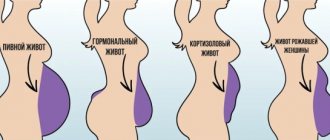What is a "breakdown"
I was on a diet, ate right, counted calories, didn’t allow myself anything sweet, not even buckwheat or pasta, if we were talking about low-carb or keto, and then - BAM! - darkness... And then you find yourself on a mountain of candy and chocolate wrappers, an empty bucket of ice cream on your head, a half-eaten piece of cake in your hand, your stomach is so full of sweets that it’s hard to breathe. Congratulations - you've nailed it! Happens.
This also happens with training. You go like hell 4-5 times a week to the gym and the stadium, and then you can’t force yourself to get there. Even kick and drag. Of course, in this case the breakdown does not occur as sharply as in nutrition, but the thing is no less dangerous.
I missed a workout once, I missed two, and then I didn’t even notice how a couple of months flew by without jogging or “rocking.” This has happened to me once in the 20 years that I have been training with weights. One time that turned into an eight month break.
That is, a breakdown is a sudden overeating on a diet and an unexpected break in training, which can be dangerously prolonged.
How to prepare your body for a diet
It will be much easier to prevent breakdowns in the future if you switch to a new nutrition system already prepared - both physically and psychologically.
First of all, you cannot switch abruptly to a new nutrition system with a significantly reduced number of calories per day. Nutritionists strongly recommend making at least a few days transitional. At this time, you should remove fried, salty and fatty foods from your diet, and also reduce portions. You should not eat before going to bed; in extreme cases, you should limit yourself to a glass of kefir or an apple.
Before starting a “new life”, you can arrange a fasting day or carry out a gentle cleansing of the body. As for how to prepare yourself psychologically for a diet, such preparation must also be done correctly. In many ways, the psychological mood depends on how well the weight loss process is motivated.
Why does a breakdown occur and how to avoid it
There are many reasons: fatigue of the central nervous system (CNS), basic instincts, physiology and even psychology. Moreover, failure factors are usually intertwined.
If we dig really deep, we get to hormones, biochemistry and the basic reward system. Most readers will put such details to sleep, so I’ll limit myself to a simple, albeit exaggerated example (don’t do as it’s written there, don’t organize bad marathons with unbalanced and hungry mono-diets).
The man decided to go on a diet and, as often happens, tightened all the screws to the maximum. He eats nothing except buckwheat, grass and a strong belief in his own abilities. And this is after total food debauchery in the form of uncontrolled consumption of sweets, pickles, beer, hamburgers, ice cream and other tasty, but unhealthy things.
On the one hand, bad things happen to the body, because such a drastic change in diet and reduction in calories is a big stress for it. On the other hand, the body does not care that the owner wants to lose weight, it only cares about survival and having an energy reserve in case the stressful situation repeats.
First of all, it pumps the body with hormones, forcing it to increase search activity in order to feed itself. I think those who have lost weight remember this feeling of euphoria and vigor in the first few days, or even a week after starting a cruel diet. A person thinks how strong he is, he does everything right, the diet works - life is wonderful. But in fact, this is only a basic defense mechanism, working on instincts. Something akin to a powerful release of adrenaline in a critical situation, so that a person can either quickly run away from danger or confidently attack the enemy.
What happens after a period of hyperactivity in a critical situation? Right! A period of severe loss of strength. The same thing happens during thoughtless manipulations with the diet, only the time intervals are different. In the first case, we are talking about minutes or even seconds. In the second - about days or about a week and a half.
That is, the body turns on energy saving mechanisms, reducing brain and motor activity. You feel sleepy, sluggish and at the same time struggling with a constant feeling of hunger and the desire to devour everything that is not nailed down. Moreover, it is desirable that the food be higher in calories, fattier, and sweeter - these are also instincts.
Thus, at first the nervous system was inflated by hormones that forced it to increase activity, which greatly affected its resources. And then she is exhausted by hunger. Like muscles, the resource of the nervous system is not infinite. When it ends, a breakdown occurs. For some it is earlier, for others it is later, but it happens.
At a basic level, all this is also regulated by hormones, including serotonin (the so-called happiness hormone), which is associated not just with the desire to eat, but to eat harmful sweet treats. A large portion of sugar releases more serotonin than lean buckwheat or boiled chicken breast.
How to solve a problem?
In terms of logic, it’s simple, but implementing the solution in reality is more difficult, but nothing is impossible. Judge for yourself, if you can’t live without serotonin and other happiness hormones, you just need to find another way to get them. After all, they are released not only in response to the intake of certain nutrients.
You were praised by friends and acquaintances - this is the release of a small portion of serotonin. Finished a difficult task - another release of happiness hormones. I saw in the mirror the result of 4 months of work in the form of six-pack abs and powerful biceps - a little more serotonin for the piggy bank. I published this result on Instagram, received enthusiastic comments, and the body again responded with a portion of good hormones. You got behind the wheel of an expensive car or entered your own well-furnished new apartment, for which you have worked in the last months or several years - receive encouragement from your body in the form of a pack of happiness hormones.
Of course, it’s easier to eat something delicious than to follow a training and nutrition regimen day after day for months or to work on your own business (or even work in both directions at once), but the final result is completely different, it differs by orders of magnitude. Get a little here and now, or a lot, but after some time.
Yes, you will have to spend more energy, but in addition to a powerful portion of happiness hormones and a large amount of them, you also get other advantages. A beautiful, strong and healthy body, financial independence, recognition and gratitude from other people if you do something useful for them. Plus, in the process of achieving a big goal, habits change and what was previously difficult and stressful becomes a way of life, and you also begin to enjoy it. From a balanced diet and a feeling of peace in the stomach, from training and a feeling of strength, muscle tone, from a job well done, from order in the house and in the family.
It takes an average of three weeks for any habits to form or disappear - good and bad. By systematically moving towards a big goal, there is a chance to form a pool of good habits by getting rid of bad ones.
That is, the solution is the following - set big, but realistic goals and focus on them, and not on momentary pleasure. It’s hard, you want quick pleasure here and now - at this very moment, think about what you will achieve in the end if you don’t fail. That is why it is important to set clear goals so that you can imagine a real result, which will help you not go astray and not be distracted by trifles. And if you get lost, then a big goal and a clear idea of it will help you get back on track .
The most important thing is that you should not overestimate short-term efforts (lose 20 kg in a month) and you should not underestimate long-term efforts (get yourself more or less in shape in 4-6 months). When you do a little, but every day for a long time, the final result will be impressive. This is what I slowly achieved in 2013 as I worked toward my goal day after day.
One of my inspirations then was Denis Borisov , whose work I recommend for study to those who want to replenish their knowledge base about what is important and useful for self-development (website, YouTube, Instagram).
Since then, I have developed a number of useful habits, continued to develop in the chosen direction, after which I set the goal of achieving peak form for myself (and really understanding the issue deeply, I was tired of experiments and searching for pearls in the information manure). This took 4.5 months of systematic work (the first photo on the left - the end of March 2020, weight - 104.5 kg; on the right and a couple of photos below - the end of August 2020, weight - 96.5 kg):
This time I was inspired by the works and direct help of Yaroslav Brin (Instagram, YouTube, website) - I also highly recommend studying it.
Don't forget about my own column on healthy lifestyle and sports . What is this for? Everything is simple when it comes to self-development in any area - no one will give you a ready-made recipe , but you can find a lot of useful information that adapts to your own realities. You read, adapt, take and do . Little by little, but every day and over a long period of time.
Nevertheless, as I wrote at the beginning, everyone has breakdowns and it is important to minimize the consequences.
Don't make a tragedy out of it
Any diet is always stressful for the body, which begins to accumulate reserves “in case of war.” And even with steely willpower, sometimes we break down and have a “feast.” If a breakdown occurs, there is no need to go to extremes and make a tragedy out of it. The main rule is to never blame yourself or scold yourself. We need to realize that we are all imperfect and failure to diet is not the worst thing that can happen. Otherwise, you can get even more upset and start eating away your disappointment with unhealthy food.
All actions are born in our head, so the main thing is positive attitudes. Better praise yourself for being able to stop. This day does not change anything fundamentally. If you put your mind together, you can change everything. Sometimes you can treat yourself to something tasty and there’s nothing wrong with that. Just remember that this should not be repeated on a regular basis.
The next point is a return to normal kilocalories. There is no need to go on a hunger strike the next day. To get into the rhythm more correctly, eat as usual. But on this day you can reduce the amount of carbohydrates by adding more protein to your diet. This will help you feel fuller and stabilize your blood sugar levels. Be careful about the amount of water you drink. Add as much clean water to your diet as possible to balance your body's hydration levels.
Motivation
A very important point for those who intend to keep a diet is the right motivation. The desire to lose weight alone is not always a sufficient motivation for the successful implementation of this desire. The correct and clear motivation for action is important - that is, an awareness of why exactly it is necessary to lose weight. Having such motivation will help you resist temptations and strictly adhere to the principles of the chosen nutrition system.
Psychologists identify a number of wrong motives that are often used by those losing weight. Among these are the following:
- The desire to be like a famous person - an actress, singer, athlete, etc. It is important to take into account that the image of an idol is created through the work of an entire “army” of cosmetologists, plastic surgeons and, finally, with the help of Photoshop and other programs. Therefore, the desire to be like a star will inevitably lead to disappointment.
- Get your ex-husband or wife back. This desire also in most cases leads to disappointment. After all, most likely, the partner leaves not because of excess weight , but due to other reasons.
- Hatred of extra pounds. If a person does not like his body in an imperfect state, there is no guarantee that he will begin to like it after losing weight.
A completely different motivation is correct. First of all, psychological preparation should be for a person to clearly understand the purpose for which he is losing weight. It is also worth defining a unique ideal, for which a personal photograph taken at a time when the person liked himself would be suitable. The important thing is to realize that a few years ago he might have looked good. This means that achieving such a goal is quite possible.
You should also define several theses about the advantages of losing weight, which will motivate you when it will be very difficult to restrain yourself from a breakdown. They might sound something like this: “I will look great in tight-fitting clothes”, “I will feel much better and will get rid of constant shortness of breath”, “I will like myself and it will be easy for me to choose clothes in the store”, “I will be able to be active play sports and do exercises that I couldn’t do before.”
Strength of will
How to stick to a diet and not break? Most people are confident that by following strict dietary restrictions, they will soon achieve their goal. And the most interesting thing: almost everyone is sure that willpower will help not to relapse.
Let's consider the situation in practice. Imagine two people. One follows a strict diet, and the other eats whenever he wants. A dish of sweets was placed in front of them. The person losing weight endures and does not deviate from his goal. And the second one immediately runs to make a cup of coffee to go with the sweets. Research has shown that if these two people are loaded with hard work, the brain will take advantage of this situation and “send a signal” that will destroy self-control. As a result, a person who has been on a diet will break down and overeat. And those who have not restricted themselves in nutrition will eat the norm.
The human body loves stability. Therefore, in order to lose weight, you do not need to resort to strict dietary restrictions.
Weighty arguments
In order not to waste time once again thinking about how not to fall off the drinking diet or the “minus 60” nutrition system, you need to properly motivate yourself.
- The desire to please others. This is a rather weak incentive for losing weight. The fact is that the opinions of others only concern people with complexes and lack of self-confidence. But if this is not about you, then take note.
- Delight your beloved man. But some women are sure that their husband should always love them, despite his excess weight.
- Like yourself. But this argument also makes you think, since most representatives of the fair sex are of the opinion that it is necessary to accept yourself as you are.
- For some, a serious incentive is the desire to fit into old jeans or a favorite dress. And sometimes it works.
- I often fall off my diet. Then you need to prove to yourself that everything will definitely work out.
- Solve health problems. Often people with excess body weight are bothered by shortness of breath, pain in the legs, sweating and skin problems. These are serious reasons to start fighting extra pounds.
- Most people lose weight by summer in order to show off their chic figure on the beach in a swimsuit.
- So that your loved one can easily pick you up.
There seems to be motivation, but there is no confidence. How not to go off the diet? Denis Borisov believes that for this it is necessary to awaken “bad instincts” in yourself, that is, to want to become better than everyone else. In addition, it is very important that life is eventful. It is much easier for a person who is engaged in a favorite activity or hobby to limit himself in nutrition.










